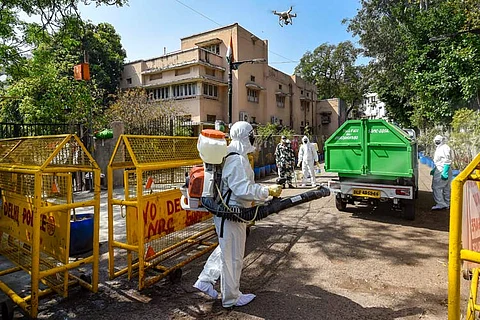

On March 31, a 49-year-old man who tested positive for coronavirus passed away at Gandhi hospital in Hyderabad. His two relatives, who had also tested positive, assaulted the on-duty doctor.
A few days later on April 2, health officials in Nizamabad district were prevented from entering a locality to collect health details from the community over fears that they were collecting details for the National Population Register (NPR). “They were getting ready to beat us. We were all women and in a group, so we escaped,” said a health official to the media, “They abused us very horribly. They threatened us and said that if we had been men, they would have beaten us. It was a very bad situation. They refused to give us any information. They said that they won't even tell us if they have symptoms of coronavirus…We are still ready to go tomorrow and do the work but we need security. There should be police protection,” the official said.
Such dangerous and unreasonable attacks on doctors and health workers in Telangana by the public and by COVID-19 patients is a result of poor communication about the disease, say those working closely with the health sector and with local communities in the state.
Nizamabad, Telangana:
— . (@santosh4bharat) April 1, 2020
As per the video, Health workers were attacked by locals when they entered Muslim dominated area and tried to collect their medical details. Locals even refused to share their travel history to COVID effected nation. pic.twitter.com/jBYI49roQk
At Hyderabad’s Gandhi hospital, the two COVID-19 patients who assaulted the junior doctor were first reported to have been upset over the death of their relative, and thus lashed out at the doctor. Dr B Pratap Reddy, Indian Medical Association (IMA) Telangana President said, “There was a delay in the body of the COVID-19 patient being released to the family, that was what led to the junior doctor being assaulted.” The doctor is of the view that there has been a collective failure to communicate to the public about how infectious the disease is.
“The years of neglect of the health sector in the country has ended in no coordination between the health officials and the public during a pandemic,” Dr Pratap says, “The attack on doctors and the denial of permission to enter localities is also because of this lack of coordination and public awareness. The link between the public and the health department through local governance bodies like municipalities is absent. All the municipality does is sanitisation, dog sterilisation, and food quality checks. There is no advocacy about the disease happening on the ground.”
But local representatives say, they’re doing everything they can in the given situation. At Banjara hills, the local corporator, Vijaya Laxmi R Gadwal, is keeping a close watch on the health of those residing in slums, ensuring physical distancing and lockdown measures are followed thoroughly. “What else are we supposed to do?” asks the corporator.
At wards like Chandrayangutta, Kanchanbagh and Golconda, the corporators are focused on relief measures ensuring rations, medical supplies are provided to the needy and migrant labourers.
And the pressure to be seen as ‘doing something’ to lessen people’s anxieties is growing. In Boudhnagar, for instance, the corporator had to deal with anxious residents who were under the impression that disinfectant spraying would help contain the spread. The corporator carried out the spraying despite being aware of it not being a solution to contain the spread of the coronavirus disease.
“There is a need to push for the second stage of communication at the community level because now things have changed,” says Anant Maringanti, the director of Hyderabad Urban Lab, a multi-disciplinary urban research centre based in Hyderabad, “Most people are looking at this as a personal disease and not as public health issue concerning the entire population. Look at the official communication that has come out so far. It is all about personal hygiene.
Anant draws attention to the messaging behind the push for personal hygiene as an indicator of how ground reality is far from what the message professes.“We have focused a lot on personal hygiene and personal behaviour. But in Moti Nagar, at an non-notified slum of 200 people, the water is supplied on alternate days by a tanker. They don't have proper storage facilities even for this water. If you go and give them a bar of soap, and lecture them on how they should wash hands frequently under a tap for 20 seconds each time, what are they going to do? Such places are there in every ward. It's a scary situation,” he says.
“At the other end, we have a serious problem of coordination between departments that no one is talking about. There is a communication failure from the part of the Union Health Ministry. The officials on the ground are not trained to provide awareness on COVID-19 either,” says the researcher. The present messaging promotes stigma over the disease, he adds.
In Kerala, a man who recovered from COVID-19 was turned away by his family, said the Kerala Chief Minister Pinarayi Vijayan at a press meet, calling the incident disturbing and condemning the act. In Mumbai, a 65-year-old Muslim man was cremated after the local cemetery denied permission to bury his body.
“The instructions for advocacy should come from the higher-ups and those on the ground should be empowered to do adequate advocacy,” says Indivar Jonnalagadda, a researcher from the University of Pennsylvania, “In Italy and the US, many are unable to see their loved ones after their demise. There is a need to sensitise the public on this sensitive topic. This has to be communicated to the people and an effective communication strategy has to be developed,” he adds.